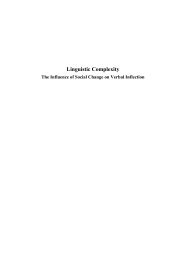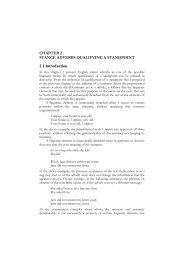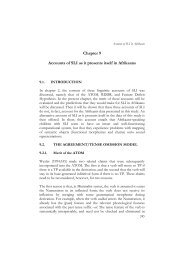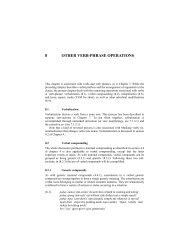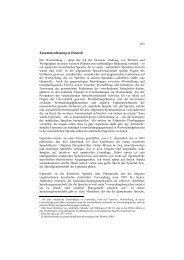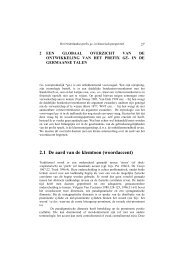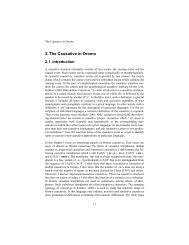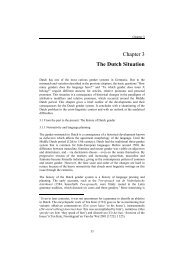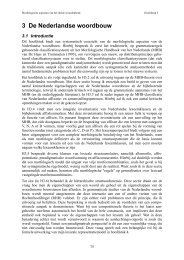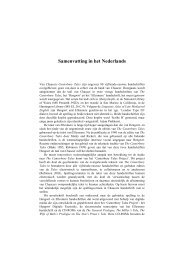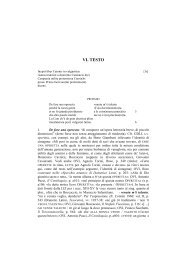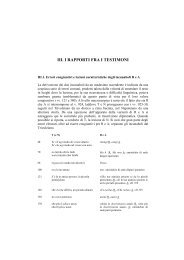Chapter 3 - LOT publications
Chapter 3 - LOT publications
Chapter 3 - LOT publications
Create successful ePaper yourself
Turn your PDF publications into a flip-book with our unique Google optimized e-Paper software.
72 Reduplicative coordination constructions<br />
Of course, this is not particularly surprising since all the predicates in a ReCo<br />
construction are identical. Thus, unlike ConCo and SceCo where there is a non-local<br />
relationship between the lexical verb and the subject, in ReCo, the subject is always<br />
in a local relationship to the first verb, which appears to be lexical. For this reason,<br />
one needs to differentiate whether it is the first verb of the ReCo construction that<br />
selects the subject (in which case ReCo would pattern with SceCo) or whether it is the<br />
second verb that selects the subject (in which case ReCo would pattern with ConCo).<br />
Unfortunately, given that both verbs are identical it is not possible to tell directly which<br />
of these options is the correct one. 12<br />
3.2.11 Restrictions on which verbs can occur in ReCo constructions<br />
ReCo constructions are very productive. However, there are restrictions on which<br />
verbs can enter into this construction.<br />
(66) *John did and did something [Light verb]<br />
(67) *John will and will do something [Modal]<br />
(68) *John has and has done something [Auxiliary]<br />
(69) *John resembled and resembled his father [States]<br />
(70) *John won and won the race [Achievements]<br />
(71) *John ate and ate 46 hamburgers in only 2 hours [Accomplishments]<br />
(72) John walked and walked for hours [Activities]<br />
(73) John shot and shot at the rabbit<br />
‘John repeatedly shot at the rabbit’ [Serial Achievement]<br />
Two generalizations can be made from these data. Light verbs like do as well as<br />
modals and auxiliaries cannot occur in ReCo constructions. In other words, ReCo constructions<br />
are limited to lexical verbs. The second generalization is that only activity<br />
verbs can occur in these constructions, although some endpoint implying verbs can<br />
occur in ReCo constructions with serial or repetitive readings, i.e. they are construed<br />
as activities. The main point I am trying to make is that there is (i) a definable class<br />
of verbs entering into ReCo constructions (activity verbs) and (ii) there is a definable<br />
class of verbs which do not participate in this construction (modals, light verbs, states,<br />
achievements and accomplishments). This is also a property of pseudo-coordinative<br />
constructions generally (section 2.1.10).<br />
12 However, given that with respect to the semantic bleaching and VP-ellipsis tests ReCo patterns with<br />
ConCo, it is perhaps reasonable to assume that it is the second verb that selects the subject in ReCo constructions<br />
and that they thus pattern with ConCo.



